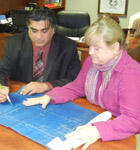Credit unions are designed by the people for the people, and DOCO Regional Federal Credit Union is no exception. While it offers standard financial instruments such as checking and savings accounts as well as mortgages and auto loans, its primary mission is to improve members’ financial well-being and help the less fortunate. Started in 1959 and run by an all-volunteer board, the Georgia-based company helps the underserved with starter products and low-rate loans that provide opportunities they might not receive elsewhere and is dedicated to financial education and giving back. Profile sat down with Barry Heape, president and CEO, to learn more about what has made this regional icon a success for 53 years.
DOCO serves more than 200 small companies. Why are you organized this way?
With a diverse membership, we’re just better able to weather tough economic times. It gives us a greater ability to grow and generate economies of scale, allowing us to offer more products and services at a lower cost. We work with everyone from manufacturers to government, schools, doctors, and lawyers. We will offer our services to any organization that has a need for them. Our goal is to offer to as many groups as possible.
How do you help the underserved through the products and services you offer?
We have several products and services that cater to them, such as our Fresh Start checking. With a minimum $100 balance in their savings account, we limit the number of checks they can write and give them one year to build good credit with us, then we put them into a regular account. We also do high-risk auto loans that utilize a technology called a “starter interrupter.” It’s a device installed on the car that, if they don’t make their loan payment within a certain grace period, the car won’t start. Our members love it, because it allows them to have a car they otherwise wouldn’t be able to buy, and it helps them improve their credit scores over time.
Tell us about some of the charitable programs you sponsored in 2011.
We do a lot with Children’s Miracle Network. We support Albany’s annual Alzheimer’s Walk. DOCO raised and distributed $30,000 in 2011 in support of all kinds of organizations: The Boys & Girls Club, Habitat for Humanity, Meals on Wheels, the Food Bank, Salvation Army, United Way, Humane Society, Red Cross, Newspapers in Education, and then a lot of smaller ones like golf tournaments and special requests we get from members and member groups. We continue to help as many as we can, and we encourage all of our employees to get involved.
DOCO is very involved in financial education. Tell us about these programs.
We distribute financially oriented learning materials to 130 different schools in southwest Georgia. We give elementary schools games that teach kids how to count money, what money is for, and how it should be used and saved. For the high schools and junior highs, we give them computer software. We also have a member-relations person who conducts financial-literacy classes in schools. She reaches more than 2,000 students annually from pre-K to the college level.
How is the credit union benefiting from your feedback forum?
The feedback forum tells us what we need to keep doing, stop doing, or start doing and we regularly make changes from that information. We recently opened up two branches on Saturdays for drive-through service and expanded business hours at all our other offices during the week for walk-in service. Any products and services our members ask us for we will use that information and start moving in that direction.
You switched from a federal charter to a state charter in December. What will that mean for DOCO’s growth going forward?
It will give us the ability to offer more services to more areas and allow more members to come into the credit union. We want to expand and grow in our north Georgia area and that’s where we will start out working toward.

